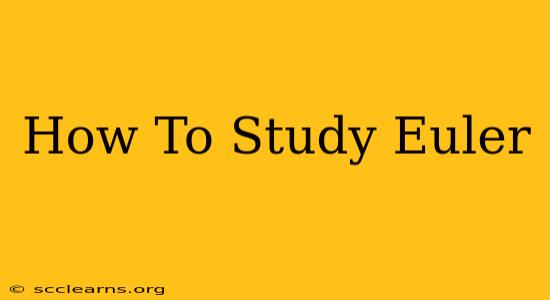Leonhard Euler, a name synonymous with mathematical brilliance, left behind a legacy so vast it continues to inspire awe and challenge mathematicians to this day. Tackling Euler's work can feel daunting, but with a structured approach, you can unlock the treasures of his profound contributions. This guide provides a roadmap for effectively studying Euler, catering to both seasoned mathematicians and enthusiastic beginners.
Understanding the Scope of Euler's Work
Before diving in, it's crucial to recognize the sheer breadth of Euler's contributions. He wasn't just a mathematician; he was a polymath, making significant advancements in various fields, including:
- Number Theory: Euler's totient theorem, Euler's criterion, and his work on prime numbers are cornerstones of modern number theory.
- Calculus: He refined and extended calculus techniques, introducing notations we still use today (like e and i). His work on differential equations and infinite series is fundamental.
- Graph Theory: Euler's solution to the Königsberg bridge problem laid the groundwork for this entire field.
- Analysis: His contributions to complex analysis, particularly his formula e^(iπ) + 1 = 0, are breathtakingly elegant and profound.
- Mechanics and Physics: Euler's equations of motion are essential in classical mechanics. He also made substantial contributions to fluid dynamics and optics.
Choosing Your Starting Point: A Gradual Approach
Don't try to tackle everything at once. Euler's work is best approached strategically. Begin with areas that align with your current mathematical background and interests. Here's a suggested progression:
1. Building a Strong Foundation:
- Prerequisites: Before delving into Euler's advanced works, ensure a solid grasp of fundamental calculus, algebra, and trigonometry.
- Introductory Texts: Start with introductory texts on calculus, linear algebra, and number theory. These will provide the necessary tools to understand Euler's techniques.
2. Focusing on Specific Areas:
Once your foundation is solid, select a specific area of Euler's work to focus on. Consider your interests and current mathematical abilities. For example:
- Beginners: Start with Euler's work on graph theory (the Königsberg bridge problem is a great introduction) or his elementary number theory.
- Intermediate: Explore Euler's contributions to calculus, focusing on specific topics like differential equations or infinite series.
- Advanced: Tackle his more complex works on complex analysis or his contributions to mechanics and physics.
3. Utilizing Available Resources:
- Original Works: While challenging, reading Euler's original writings offers unparalleled insight into his thought process. Many of his works are available online in translated versions.
- Modern Texts: Numerous modern textbooks and monographs delve into specific aspects of Euler's work, providing a more accessible explanation.
- Online Courses and Lectures: Several online platforms offer courses that cover various aspects of Euler's mathematics.
Effective Study Techniques:
- Active Reading: Don't passively read Euler's work. Work through the proofs and examples, actively engaging with the material.
- Problem Solving: The key to mastering Euler's work is practice. Solve problems related to the concepts you're studying.
- Note-Taking: Maintain detailed notes, summarizing key concepts and highlighting crucial techniques.
- Collaboration: Discussing Euler's work with peers can provide valuable insights and help clarify difficult concepts.
- Patience and Persistence: Studying Euler requires patience and perseverance. Don't get discouraged by challenging concepts – persistence is key.
The Rewards of Studying Euler
The journey of studying Euler’s work is a rewarding one. You'll not only gain a deeper understanding of mathematics but also appreciate the ingenuity and elegance of one of history's greatest minds. His contributions continue to shape modern mathematics, and by studying his work, you'll gain a profound appreciation for the beauty and power of mathematical thought. Embrace the challenge, and you will be richly rewarded.

